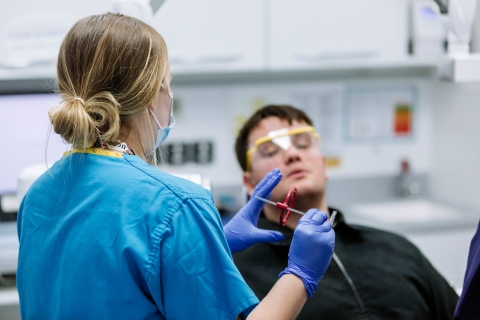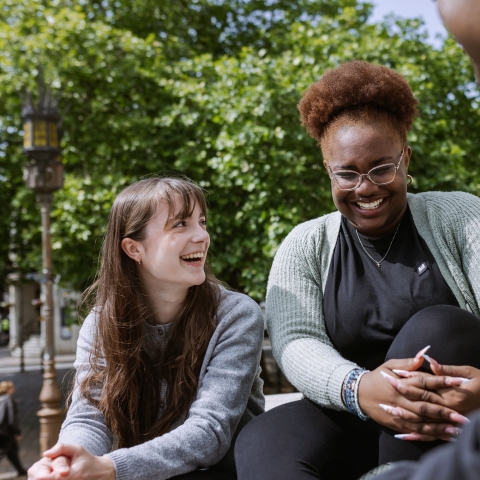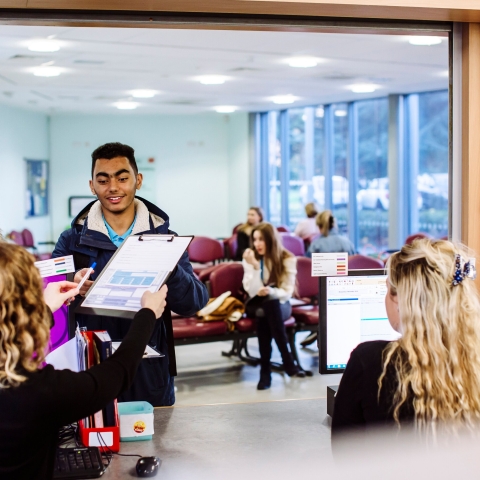

Read our tips for taking care of yourself and staying fit while you study
Staying healthy and physically fit boosts your mood, concentration and energy. And can help you keep on track with your studies.
When you start uni
If you move to a new city, you should register with local medical services when you arrive to make sure you can get treatment when you need it.
At the beginning of the academic year:
- register with a doctor
- register with a dentist
- check you are up to date with your vaccinations
- find out how to access uni support services
- find out where your local minor injuries unit is
- find out where A&E is, just in case
Find your nearest pharmacist, GP surgery and other services on the NHS website. Once registered, make sure your doctor knows about any prescriptions you need. Register with a local pharmacy and confirm your prescription will come through on time.
You can see a GP for emergency treatment for up to 14 days if you're unregistered.
Protect yourself and others with vaccinations
It's important that you keep up with your recommended vaccinations, both for your protection and others. As a student you're at higher risk of infections because you'll be meeting and mixing with lots of new people, some of whom may unknowingly carry different bacteria. If you're uncertain about your protection, contact your GP.
Key health conditions and vaccinations
Some strains of meningitis and septicaemia (blood poisoning) can be prevented with vaccinations.
If you're coming to university for the first time and are under the age of 25, you should contact your GP to request the MenACWY vaccine as soon as possible. This is especially the case if you missed having it at school or before coming to the UK to study.
It's also important that everyone is aware of the signs and symptoms of both meningitis and septicaemia, including:
- violent and severe headaches
- high temperature/fever
- vomiting
- neck stiffness
- dislike of bright lights
- drowsiness/lethargy
- joint pains
- fits
- a rash may appear
Get medical help immediately if you or your friends experience these symptoms - call NHS 111 for urgent advice, or 999 in a medical emergency. For more information visit the NHS website.
We encourage everyone to take up vaccination against Covid provided by the NHS. This includes international students - anybody aged 16 or over in the UK is eligible for the Covid-19 vaccination for free, regardless of their nationality or immigration status. Book a Covid vaccination appointment through the NHS.
Who to speak to when you are unwell
If you get sick, below is a list of people to reach out to - or you can call 111 for advice.
Pharmacists can issue prescriptions, over the counter medicines, and help with a range of health issues and minor illnesses. Your pharmacist can also help with emergency contraception and incontinence supplies.
You don’t need an appointment to speak to a pharmacist. Pharmacies also have consultation rooms if you’d like to speak to someone in private.
You should speak to a pharmacist if you have:
- a sore throat or cough
- a cold or flu
- hay fever
- earache
- stomach complaints or diarrhoea
- a skin condition or rash
- allergies
- thrush
- aches and pains
Your GP can diagnose conditions, prescribe medications, help you manage chronic issues, and refer you to other medical services.
Speak to your dentist if you have a toothache. If you aren’t registered with a dentist, call 111 for details about emergency dental services in your area.
Walk-in centres offer medical advice and treatment without an appointment for conditions and injuries that don’t need A&E, or if you can’t wait for an appointment with your GP. Find your nearest urgent care centre at the NHS website.
Walk-in centres can help with issues like:
- skin concerns including cuts, rashes and minor burns
- sprains
- broken bones
- bites and stings
The Minor Injuries Unit treats non-urgent health issues.
You should go to minor injuries if you have:
- a broken bone
- an infection
- minor burns
- a minor head injury
- back pain
The Accident and Emergency (A&E) department is for emergency and life-threatening situations. A&E is open 24 hours a day, 365 days a year.
999
Call 999 immediately if you are in an emergency situation and someone’s life is at risk.
Staying healthy during your studies
Your health is linked to a range of factors. Being healthy doesn't mean cutting out things like desserts or rest days. Looking after yourself means balancing your lifestyle and listening to your body.
Keep a first aid kit
Make a small first aid kit to keep at home. Include plasters, pain killers, allergy medication, tweezers, antibacterial wipes and cold relief. If you're ill or have a minor injury, it's better to be prepared at home than have to go to the shop.
Sleep well
Sleeping helps your body recharge, rest and heal. Getting at least 8 hours sleep means you'll be refreshed and prepared each day for your studies:
- control your bedroom – decide whether you want to listen to music, soothing sounds or silence, how much light you need to sleep, and how warm you want to be
- build an evening routine – a lot of people enjoy calm activities like reading or meditating before going to bed
- turn your phone off or put it on silent and out of reach overnight
- exercise during the day so your body is tired
- avoid caffeine and food soon before bed
Food safety
Food hygiene is important when you're cooking at home. This means storing, preparing and cooking your food safely. Wash your hands regularly and before you cook. Use protective equipment like oven mitts and an apron when dealing with hot food. Make sure that food is fully defrosted before you use it and cooked thoroughly.
You should only reheat leftovers once.
Keep your food safe by storing food in sealed containers. Perishables like milk, meat, sandwiches and ready meals should be kept in the fridge. Don't overload your fridge and keep raw food separate, with cooked food stored above raw foods like meats.
Eat healthily
Choosing the right foods will help boost your mood and energy, and help you sleep. Start the day with a good breakfast, eat regularly throughout the day, and opt for healthy snacks. Try to include fruit, vegetables, protein and fibre to build a balanced diet. Find out where to eat on campus
Drink plenty of water
Staying hydrated is important – even mild dehydration can impact your concentration. Make sure you drink at least 2 litres of water a day to stay hydrated. You can take a water bottle to lectures and refill it on campus too.
Monitor your alcohol
If you drink alcohol, keep track of how much and what you drink. Drink water in between your alcoholic drinks to minimise hangovers. Stick to your limits and don't leave your drinks unattended. Buy your own drinks or go to the bar with anyone who offers to buy you one.
Exercise regularly
Physical activity supports your fitness, wellbeing and mental health. You can exercise socially or on your own. Consider joining a society or sports club for regular activity with new people – or going out for walks for some peace and quiet and to explore the local area.
Our sports facilities have great student memberships which are flexible to meet your needs and start from only £15 per month.
Sexual health
If you're sexually active, it's important you look after both your physical and mental wellbeing. Whether that's thinking about healthy relationships, contraception, or STIs, there's lots of support available. Find out more about safe sexual relationships while at university.
Read more
Student Services
When you’ve got questions about uni life, we help you find the answers. Turn to Student Services for advice and guidance on student accommodation, health and wellbeing, money and finance, academic and disability support, and life as an international or PGM (People of the Global Majority) student.

Student Wellbeing
Your health and wellbeing matters. Access resources for your mental and physical health, including support from Student Wellbeing, university counselling, and tips for self-care.

Register with a doctor
It's important to get registered with a local GP to be able to access local health services.

Enable University alerts
Turn on notifications for critical updates like closures, safety alerts, and urgent service disruptions.





